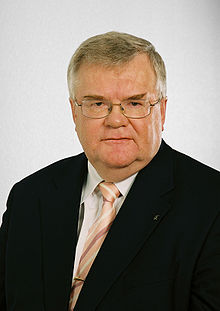Edgar Savisaar

Edgar Savisaar (born May 31, 1950 in Harku Commune, Harju County), is an Estonian politician and the leader of the Centre Party. He served as the Prime Minister of Estonia from 1990-1992. He is former Minister of Economic Affairs and Communications. Currently he is the mayor of Tallinn, the capital of Estonia.
Education
After graduating from high school, Savisaar continued his studies at the University of Tartu. In 1973, he graduated from the university with a degree in history. In 1980, he wrote his candidate thesis in philosophy on the topic "Social Philosophical Foundations of the Global Models of the Club of Rome".[1]
Career
From 1980 to 1988, Savisaar worked in governmental institutions dealing with the planning of economy. During 1988-1989, he was academic director for the consultation company "Mainor".
In 1989, he became the Vice-Chairman of the Council of Ministers of Estonian SSR and the Head of the State Plan Committee. In 1990, he was the Minister of Economy. On April 3, 1990, he was appointed the Chairman of the Council of Ministers. When Estonia declared its independence on August 20, 1991, he became the first Prime Minister of the Republic of Estonia. His government was in office until January 29, 1992, when he was forced to resign after supplement problems and continuing decline in economy.
From 1992 until 1995, Savisaar was the Vice-Speaker of the Estonian Parliament (Riigikogu). From April 17 - November 6, 1995, he was the Minister for Internal Affairs. When he was accused of recording private conversations of other politicians, the entire government faltered. Although his participation in the recordings was never proved, he announced his intention to leave politics. However, in 1996, he participated in the elections of the Riigikogu and became the Chairman of the Tallinn City Council. His return to the Centre Party leader's post evoked a split, as some leading members disillusioned with Savisaar's leadership style left to found Arengupartei. From 2001 to October 14, 2004, he was mayor of Tallinn. On 11 April 2005, he became Minister of Economic Affairs and Communications in the new coalition of Prime Minister Andrus Ansip.
Edgar Savisaar and Estonia People's Union leader Villu Reiljan jointly supported Arnold Rüütel's candidature for presidency in August-September 2006; Toomas Hendrik Ilves was elected though, a choice criticised by Savisaar and attributed by him[2] to alleged hostile media and partisan lawmakers. Savisaar refused to congratulate the winner. [3]
Savisaar has published four books. He received the Order of State Coat of Arms in 2001.
Controversy
Savisaar is one of the most controversial politicians in Estonia. While some people, including many from the Russian-speaking minority, see him as a defender of poor, his political opponents accuse him of authoritarianism, nepotism, corruption, destructive intrigues, and having close ties with Russian politicians. The latter accusation has been fuelled by the Centre Party's collaboration treaty with Putin's United Russia party. Savisaar is often associated with using Machiavellian politics and deals to achieve his goals, such as taping other politicians, which caused the so-called tape-scandal; and while being the mayor of the Estonian capital Tallinn, real-estate deals that were good for the members of the Central Party, but bad for the town. [4]
Bronze Soldier
During the events surrounding the Bronze Soldier, Edgar Savisaar spoke out against the removal of the monument and accused Andrus Ansip of deliberate attempts of splitting the Estonian society by provoking the Russian minority.[5] In response to this many government officials and public figures have stated distrust and disrespect towards him.[6][7][8] In an online opinion poll conducted by a local newspaper Postimees, 87.4% of participants out of 10,000 found Savisaar to be inciting conflicts, whereas only 3.9% approved of his behavior.[9]
In relation to Savisaar's reactions to the Bronze Soldier controversy, an online petition website www.mahasavisaar.com was created on 29th of April 2007 to suggest resignation of his position as the Mayor of Tallinn.[10][11] It ended on the 9th of May 2007 and had collected 98,200 signatures. The creators of the site are currently sorting the signatures- creating statistics and finding fake-signatures.
Personal life
Edgar Savisaar has been married three times and is the father of four children.[1]
References
- ^ a b "Edgar Savisaar". biography. web site of The Government of the Republic of Estonia. Retrieved 2007-02-14.
- ^ video of Savisaar's reaction to the results: http://www.postimees.ee/240906/esileht/siseuudised/presidendivalimised_2006/219571.php?r
- ^ Postimees: Edgar Savisaar seab kahtluse alla riigikohtu erapooletuse
- ^ Savisaar's and Kruuda's mutual gifts
- ^ Lõhestaja number üks Postimees
- ^ Paet: Savisaar ei aita kaasa rahu tagamisele linnas
- ^ Peeter Oja: Savisaar on silmakirjalik ja valelik
- ^ "Rein Kilk: Savisaare loidus üllatas". Delfi Template:Et icon. 2007-04-30. Retrieved 2007-05-01.
- ^ "Lugejad: Savisaar lõhestab ühiskonda". Postimees Template:Et icon. 2007-04-30. Retrieved 2007-05-01.
- ^ Mirjam Mäekivi (2007-04-30). "Savisaare tagasiastumise poolt on allkirja andnud tuhandeid inimesi". Postimees Template:Et icon. Retrieved 2007-05-01.
- ^ "Savisaare vastu antud tuhandeid allkirju". Delfi Template:Et icon. 2007-04-30. Retrieved 2007-05-01.

